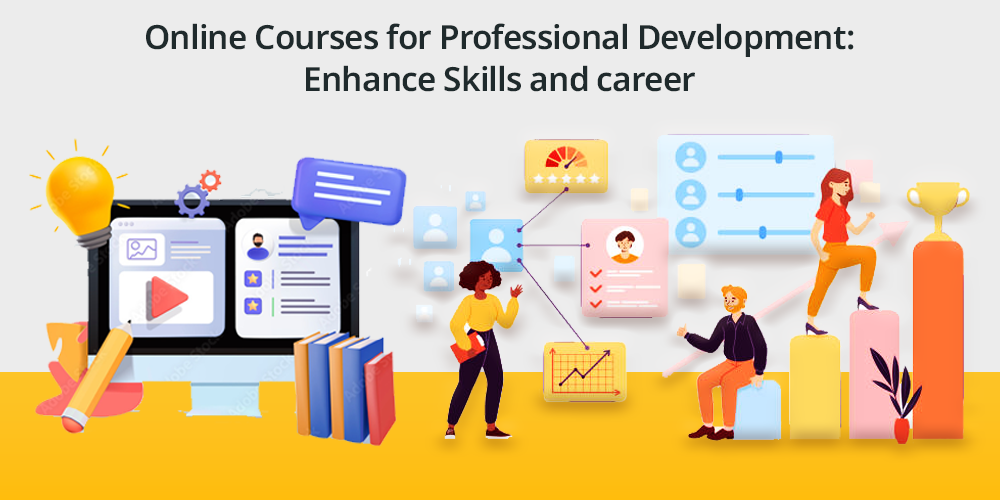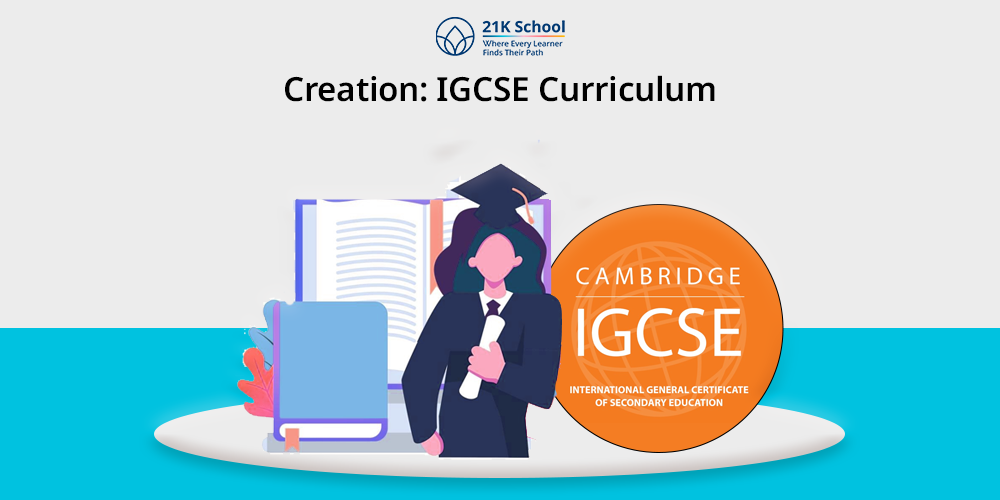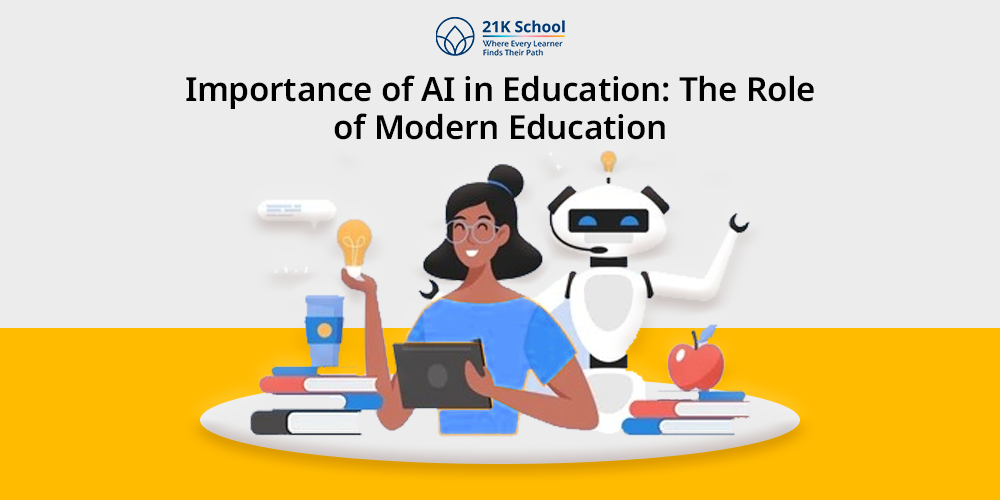
A world that is technology driven and motivated to be quantitative in all respects especially when it comes to professional spheres, it requires continuous learning and skill enhancement at all stages of life.
Courses may emerge as a powerful tool for professional development but it offers individuals with all the chances to upscale rescue and stay relevant in the industry to keep their careers safe.
Further ahead this blog deals with all the professional development that can be cheated with online courses and the factors that affect it.
Contents
- What is Professional Development?
- Factors to Consider When Choosing an Online Course
- Professional Development Online Courses
- 1. Project Management Professional (PMP) Certification – PMI:
- 2. Leadership and Management – Harvard Online:
- 3. Data Analytics Professional Certificate – Google:
- 4. Digital Marketing Specialization – Coursera (offered by the University of Illinois):
- 5. Financial Modeling and Valuation Analyst (FMVA) – CFI:
- 6. Soft Skills Training – edX:
- Types of Online Courses for Professional Development
- Benefits of Online Professional Development Courses
- Challenges of Online Professional Development
- Conclusion
What is Professional Development?
Professional development is often referred to the process where an individual in the industry acquires new skills or knowledge to stay relevant in the market and which contributes to the experience of a person improving their performance and advancing their career prospects.
Online professional development can be for various things and can include a wide range of activities such as training, workshops and certifications carried out to fulfill a person’s professional goals.
In order to stay relevant in the industry there are certain goals that a person has to achieve which enhances competency and helps them stay up to date which ultimately prepares them for the future opportunities.
Factors to Consider When Choosing an Online Course
There are some factors that a person while choosing an online course should consider as these factors will help them in selecting the right one for themselves as the task alone can be overwhelming considering all the countless options available for a person to look from.
1. Course Content and Relevance:
It is very important to choose a course that aligns with the career goal of a person and addresses all the relevant skills and knowledge that will be utilised by them to bridge the gap in their career.
This can be taken care of by analysing a detailed syllabus and analysing learning outcomes right before enrolling themselves to the course as it can help a person gauge the relevance.
2. Accreditation and Certification:
It is suggested for people to select courses based on accreditation and certification as courses offered by accredited universities and institutions carry more weightage in the professional setup as compared to normal generic courses.
Programs that have certifications attached to them from a recognised institution at value to the resume and give them an upper hand in the industry while appearing for interviews for any specific job role.
3. Cost and Value for Money:
The cost and money value for the course is the most important and crucial aspect of a course where a person has to evaluate the return on investment keeping in mind that affordability is not accessible to everyone and it needs to be monetized well.
By comparing the cost across platforms it is suggested for students and individuals to consider all the materials that are included for example cost, material, instructor support, certification and even virtual examinations.
4. User Reviews and Testimonials:
Individuals can also look for reviews and 6 support from the real life testing onions provided by the institutions of the platform which will provide insight into the quality of the course and explain the instructors expertise contributing to the overall learning experience of a person.
Certainly some of the most highly reviewed online platforms that have the feature of user feedback are Coursera, Edx or Byju’s.
Professional Development Online Courses
1. Project Management Professional (PMP) Certification – PMI:
Project management professional certification is a globally recognised course which is ideal for all the project managers who are looking to enhance their skills in project management and team development.
Certainly in some cases it is also effective for individuals who are looking forward to achieving all their objectives effectively while working in the respective fields.
Features :
- The course has a Comprehensive Project Management Framework
- The course is Global Recognised
- Project management course mainly focuses on Core Domains
- The course is believed to be agile and promote hybrid Practices in its teaching methodologies.
- The course is structured and has a rigorous Exam Preparation
- The course provides learners with all the Industry-Relevant Skills
- Project management course has a Customizable Learning model and promotes training which suits people’s other priorities aligned with their educational benefits. :
- The course has expert-Led Training and is believed to have community led forums for discussions and debates.
- The course also provides learners with Lifetime Career Benefits
Pros:
- The project management professional certification courses are recognised globally and they are known to be working immensely towards career development prospects.
- The certification course is said to be enhancing project management skills which includes a long list of things like : budgeting, risk management, and execution.
- The project is a career development course that adds credibility and professional growth opportunities to people.
Cons:
- PMR is a difficult course that requires significant experience and preparation, which is difficult to handle and requires a rigorous amount of dedication from a wider aspect.
- The project management professional certification courses that require an exam for its clearance are challenging and require high fees.
2. Leadership and Management – Harvard Online:
Leadership and management skills offered by Harvard University focuses on developing leadership qualities and strategic thinking in humans which will ultimately equip them with all the decision making abilities making them a good leader and take forward the managerial role.
Features :
- The course is designed to have a cutting-Edge Curriculum
- The course equips students with all the necessary leadership Styles Exploration, required by a student in tehri educational journey.
- It helps learners in taking care of their Decision-Making Skills And makes them confident enough to take care of any conflict that would take place in their workplace.
- The course also provides learners with Strategic Vision Development
- Leadership and Management builds Organizational Management Techniques in professionals and helps them in solving and participating in Interactive Case Studies
- Flexible Online Learning model of this course provides learners with self-paced modules with opportunities for live sessions and peer interactions — these are highly beneficial in the long run as it teaches them about global Networking in detail.
Pros:
- Leadership and management program is offered by one of the highly renowned and prestigious institutions, which adds credibility to the .
- The Leadership and management skills course is designed for students to improve leadership and decision-making skills in them and it qualifies them to provide students with all important leadership skills and qualities .
- It is suitable for both new and experienced managers.
Cons:
- Being from Harvard, obviously the course is expensive compared to other leadership courses and can not be accessible to people across all demographics and economic status.
- The course is online and is not monitored by any individual for one on one interaction, thus it requires time commitment for completion.
3. Data Analytics Professional Certificate – Google:
Data analytics and professional certificate that is provided by Google is a beginner friendly course.
The course offered by Google equips individuals with all the data analysis skills and teaches them the tools involved in the course like Excel, SQL and tableau.
The course is suitable for individuals who are looking forward to transitioning their job and starting their career in data driven roles.
Pros:
- Data Analytics Professional Certificate requires no prior experience;, thus it will be safe to say that the course is beginner-friendly.
- The course is very strategic and self explanatory thus, It covers key data tools like SQL and Tableau.
- Aside from being informative the course is affordable and accessible online, making it available for people to learn from at their own comfort.
Cons:
- The course is not as in-depth as advanced analytics programs but it is still intact to align with people’s professional goals.
- A Data Analytics Professional Certificate course may not hold as much value compared to a formal degree in data science.
4. Digital Marketing Specialization – Coursera (offered by the University of Illinois):
Digital marketing specialised course offered by Coursera is an in depth program that covers all the aspects of social media marketing search engine optimisation and also provides an insight into all the analytical functionings with the help of professionals to meet all the demanding needs of the digital marketing industry.
Features :
- The course offers a comprehensive Curriculum as the course is dedicated to digital marketing and it covers key aspects of digital marketing, including SEO, social media marketing, content marketing, and data analytics.
- It has a Multi-Course Structure and consists of 7 courses, each focusing on a specific area of digital marketing, such as customer insights, marketing analytics, and digital channels in detail which helps an individual in growing into a well-rounded individual.
- Hands-On Projects experience is offered by the course as it offers practical assignments to apply digital marketing concepts, like running mock campaigns and analyzing performance metrics, which ultimately prepares learners for real world struggles and professional upskilling.
- The course is taught by Industry Experts on a well known platform like courses : led by University of Illinois faculty with expertise in marketing and digital strategy.
- The course is focused on Data and is driven by a learner’s decision Making skill.
Pros:
- Digital Marketing Specialization course is multi level and it covers a wide range of digital marketing topics, each segment of it in detail.
- The course is taught by experienced professionals, which makes it more relevant and authentic for learners to exhibit in tehri professional life.
- Digital Marketing Specialization provides hands-on experience with marketing tools.
Cons:
- Digital Marketing Specialization course requires some concepts that may require additional practice beyond the course.
- Digital Marketing Certification alone may not be sufficient for high-level roles, there are several other support purses that will contribute to career upliftment.
5. Financial Modeling and Valuation Analyst (FMVA) – CFI:
Financial modelling and valuation analyst is a course which is designed specially for finance professionals.
It is a certification that helps individuals in enhancing their skills and finance modelling valuation and Excel proficiency.
Pros:
- Financial Modeling and Valuation Analyst is an Industry-recognized certification in finance.
- Financial Modeling and Valuation Analyst is believed to strengthen skills in a person when it comes to financial modeling and analysis.
- It is a course that improves employability in a profession of investment banking and corporate finance.
Cons:
- The Financial Modeling and Valuation Analyst course is very calculative and it always requires prior knowledge of finance and accounting.
- Financial Modeling and Valuation Analyst courses are well structured and often it can be expensive compared to other finance courses.
6. Soft Skills Training – edX:
The course provided by Edx dedicated to all the soft skills emphasizes on communication teamwork and problem solving skills which are very important for a person to thrive in a professional environment and cater to all the challenges that they’re facing.
Features :
- It is a Comprehensive Skill Development course that focuses on essential soft skills development in a learner like communication, teamwork, adaptability, problem-solving, and emotional intelligence.
- The course is strictly tailored for the Workplace and professionals who are seeking career upliftment, so it emphasizes more on practical application of soft skills in professional scenarios which ultimately enhances workplace efficiency and collaboration.
- The course is designed in a way that it has interactive Learning Modules which offers engaging video lessons, quizzes, and real-world case studies for hands-on learning experience to learners .
Pros:
- Soft Skills Training has been known for a very long to enhance interpersonal and professional skills.
- It is suitable for all career levels and industries, for people across all age groups. Especially for those who are looking for skill development..
- Soft Skills Training is affordable and flexible in learning options accessible to students.
Cons:
- Soft Skills Training are wwii equipped for people of all age groups but it may not provide a competitive edge in technical fields.
- Soft skills training is self-paced and deviation based but we can never look under the fact that it requires strong personal motivation.
Types of Online Courses for Professional Development
There are some types of online courses that can contribute to a person’s professional development.
Some of the major types that online courses offered to meet the needs of the professionals are :
1. Skill-Based Courses:
Skill based courses are the courses that are specifically designed and curated to meet the needs of a professional in a way that it focuses on specific skills to be enhanced in an individual for example coding, graphic designing or data analysis.
These kinds of courses are ideal for people who are looking to gain more knowledge about the industry or are particularly looking forward to improving their technical skills for career upliftment.
2. Industry-Specific Certifications:
Industry specific certificates are for people in their mid ages where they are seeking professional upliftment, these are those certifications that meet the needs of a specific industry like PMP, CISSP and FMVA.
The certificates are particularly helpful for people who are reflecting on their professional journey and are looking forward to finding help in demonstrating development and proving their expertise in the industry as they gain credibility with such certifications.
3. Leadership and Management Programs:
Leadership and management programs are the online courses offered by the platform to professionals who are aspiring or are in the current position of a leader.
These programs are specially designed to focus on strategic planning decision making and people management basically looks at all the skills that help in a person’s personality development.
4. Soft Skills Development:
Soft skill development is a kind of online course that is categorized to emphasize all the soft skills such as communication adaptability, teamwork, problem solving and critical thinking skills.
The skills may help a person in aiming for success in any field or any industry.
Benefits of Online Professional Development Courses
There are several benefits to a professional development hold, where the most important thing starts from flexibility and goes until the hands-on experience that it provides.
1. Flexibility and convenience
Online professional development courses are a module which is available for students to study as per their own schedule and pace so that they can easily balance their work education and other personal commitments.
2. Access to global expertise
Online platforms have not connected the world where learners can connect with educators across the globe which will help them in accessing the resources from prestigious universities and industry leaders worldwide and they will no longer be restricted to learn in traditional schooling or college environments.
3. Cost effectiveness
As compared to the traditional schooling and education online courses of a much more affordable option for students where they can compare and will not have to worry about any added expenses to be incurred in transportation, accommodation and physical study materials.
4. Continuous learning opportunities
Students in the online landscape have access to all the new courses and updates happening in the World.Professionals and learners can get involved in lifelong learning and stay ahead of industry trends and understand the landscape of their industry well.
Challenges of Online Professional Development
There are a lot of challenges that online professional development has along with the benefits discuss the year where the most important challenge that people pursuing online development courses are :
1. Maintenance discipline and motivation
Sensitive and online based course the learning is self based which requires strong discipline and motivation to complete the course on time and achieve all the desired outcomes from the course.
2. Limited hands on experience
There are some fields which require practical experience more than theoretical knowledge and that providing hands-on experience on an online platform is something that the educator struggles with and does not provide adequately to the learners.
3. Connectivity and technical issues
It is very important for learners to set up reliable internet access for their family and they have to maintain the familiarity of all the digital tools that will be required to complete a successful online learning session.
The availability of technology and connectivity is a barrier for some learners in under privileged and rural areas which restrict them.
Conclusion
Professional development is very important for a career growth which allows a learner to be flexible and be on the toes for all the technological and industry based advancement happening around.
The access to all these professional courses makes you irreplaceable. Being an online course it is flexible, accessible and cost effective in all the ways where it facilitates learning for professionals and individuals.
The courses being offered to professionals can unlock new opportunities for them where it will also be in enhancing the skills and overcoming all the professional challenges that they are facing in their life.
It is a valuable investment which will give a remarkable return on the investment in the future.



